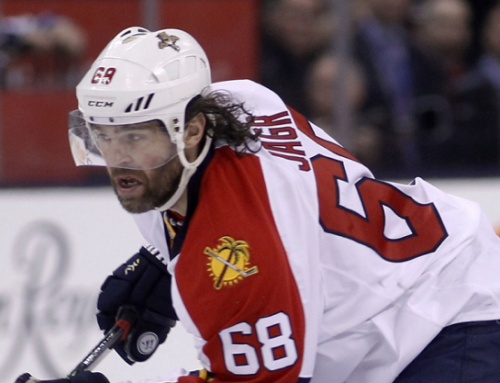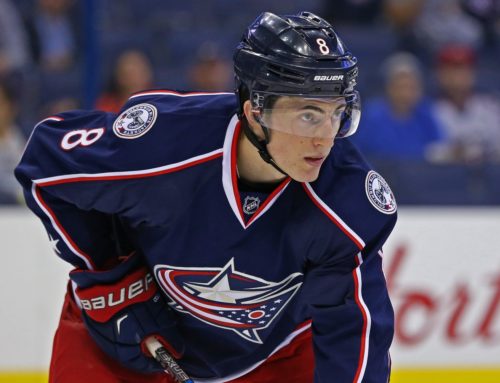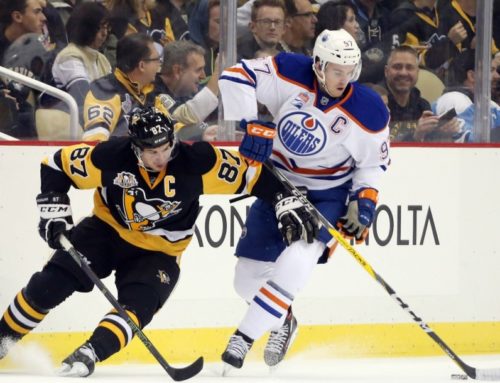
The Contrarian explains why coming up with a method to pick playoff winners is so tough.
Only one series has been finished and it is not the one people thought would be a sweep. Congrats to Montreal.
Today I go back to the Toronto Star with an article written by IJay Palansky and Phil Curry on April 17th, 2014. The article I am looking at is titled "Hockey analytics: How does momentum help teams heading into playoffs?"
They came up with a theory and formula to try and predict the first round winners of the playoffs.
Each regular season point the favorite team has over the underdog equates to a percentage point increase in their chances to be victorious. They then add on the momentum factor, which is equivalent of a 2.2 percent increase for every point to the team with the better final 10 game performance.
So, if we look at the Boston/Detroit series, the Bruins finished the season with 117 points. Detroit 93. The difference is 24 points. The result of the last ten games turns out to be a push. Detroit had one more victory but Boston had two more overtime losses. The math then dictates that Boston would be a 74% favorite.
Here are the calculations for all the series:
|
|
|
|
Last 10 |
|
|
|
|||
|
Team |
Points |
Pts % |
W |
L |
OTL |
PTS |
L10 % |
Total % |
Panel |
|
Boston |
117 |
24 |
5 |
2 |
3 |
13 |
0 |
74 |
Y |
|
Detroit |
93 |
0 |
6 |
3 |
1 |
13 |
0 |
26 |
|
|
|
|
|
|
|
|
|
|
|
|
|
|
|
|
Last 10 |
|
|
|
|||
|
Team |
Points |
Pts % |
W |
L |
OTL |
PTS |
L10 % |
Total % |
Panel |
|
Tampa Bay |
101 |
1 |
7 |
3 |
0 |
14 |
0 |
48.8 |
|
|
Montreal |
100 |
0 |
7 |
2 |
1 |
15 |
2.2 |
51.2 |
Y |
|
|
|
|
|
|
|
|
|
|
|
|
|
|
|
Last 10 |
|
|
|
|||
|
Team |
Points |
Pts % |
W |
L |
OTL |
PTS |
L10 % |
Total % |
Panel |
|
Pittsburgh |
109 |
16 |
5 |
3 |
2 |
12 |
0 |
63.8 |
Y |
|
Columbus |
93 |
0 |
6 |
3 |
1 |
13 |
2.2 |
36.2 |
|
|
|
|
|
|
|
|
|
|
|
|
|
|
|
|
Last 10 |
|
|
|
|||
|
Team |
Points |
Pts % |
W |
L |
OTL |
PTS |
L10 % |
Total % |
Panel |
|
NY Rangers |
96 |
2 |
6 |
2 |
2 |
14 |
6.6 |
58.6 |
Y |
|
Philadelphia |
94 |
0 |
4 |
3 |
3 |
11 |
0 |
41.4 |
|
|
|
|
|
|
|
|
|
|
📢 advertisement:
|
|
|
|
|
|
Last 10 |
|
|
|
|||
|
Team |
Points |
Pts % |
W |
L |
OTL |
PTS |
L10 % |
Total % |
Panel |
|
Anaheim |
116 |
25 |
7 |
2 |
1 |
15 |
6.6 |
81.6 |
Y |
|
Dallas |
91 |
0 |
6 |
4 |
0 |
12 |
0 |
18.4 |
|
|
|
|
|
|
|
|
|
|
|
|
|
|
|
|
Last 10 |
|
|
|
|||
|
Team |
Points |
Pts % |
W |
L |
OTL |
PTS |
L10 % |
Total % |
Panel |
|
San Jose |
111 |
11 |
5 |
4 |
1 |
11 |
0 |
58.8 |
|
|
Los Angeles |
100 |
0 |
5 |
3 |
2 |
12 |
2.2 |
41.2 |
Y |
|
|
|
|
|
|
|
|
|
|
|
|
|
|
|
Last 10 |
|
|
|
|||
|
Team |
Points |
Pts % |
W |
L |
OTL |
PTS |
L10 % |
Total % |
Panel |
|
Colorado |
112 |
14 |
7 |
1 |
2 |
16 |
6.6 |
70.6 |
Y |
|
Minnesota |
98 |
0 |
6 |
3 |
1 |
13 |
0 |
29.4 |
|
|
|
|
|
|
|
|
|
|
|
|
|
|
|
|
Last 10 |
|
|
|
|||
|
Team |
Points |
Pts % |
W |
L |
OTL |
PTS |
L10 % |
Total % |
Panel |
|
St. Louis |
111 |
4 |
3 |
7 |
0 |
6 |
0 |
45.2 |
|
|
Chicago |
107 |
0 |
5 |
5 |
0 |
10 |
8.8 |
54.8 |
Y |
The table is self-explanatory but just in case, Pts % is the percentage increase based on the regular season points of the team, L10 % is the percentage increase based on the record of the teams for the last ten games, Total % is the final percentage indicating the likelihood of winning the series and Panel is the DobberHockey experts consensus pick. Immediately, the proponents of this will show that if you did the calculations you should have taken Montreal over Tampa Bay. It is also looking good for San Jose and Boston managed to win their opening round series on Saturday too.
The first round is not over yet, but how does it explain that Anaheim is tied with Dallas at two games apiece at the time of this writing? The same being said about Colorado/Minnesota and Columbus/Pittsburgh. Of all the matchups though, Anaheim was the best calculated favorite at 81.6%.
In the Anaheim and Colorado cases, one would argue, "Well who would know that
These are the typical argument or justifications that come from any prediction method. You could make the same arguments regarding the Panel's consensus picks. So quantifying the data and generating a number value doesn't help predict future victors. It is just a number. Yes, the numbers say to take San Jose and the panel took Los Angeles but the numbers also say to take Anaheim, Pittsburgh and Colorado.
A secondary part of the article was to see if the last five games played of the regular season schedule had any correlation and they authors concluded that there were none. So the last five games alone do not have a correlation but the last 10 which include the last five as a subset do. I suggest that any five game span would not display any correlation to playoff performance.
One of the assumptions is that a team may have had an exceptionally good start to the season then why not exclude the performance of the first 10 games of the season and look to see if the last 72 games have a correlation to victory?
Why stop there though? How about looking at the last 20 games or games since the trade deadline or games since the All Star/ Olympic break for a momentum correlation? It can go on and on but no matter what numbers are calculated there will never be a method that predicts with 100% certainty which team will be the victor because these formulae cannot adapt for the unexpected (i.e. injuries, bad bounces, last minute penalty calls, etc.) On most days you don't need to see a weather report. You look out a window and can tell what the day is going to be like. I stress, on most days. It is the few days that you cannot foresee the changes that you can be caught in a bad situation. That is when looking at the weather forecast would have helped you.
It is the same with hockey games, 80% you do not need help with, it is the 20% that you do. The problem is which matchups will be in the 20%. Unfortunately you won't know until the games unfold.
I hope for IJay and Phil that their formula predicts all the first round winners this season. I honestly do.





 S.J
S.J EDM
EDM ANA
ANA BUF
BUF PIT
PIT MIN
MIN DET
DET CBJ
CBJ UTA
UTA VAN
VAN
